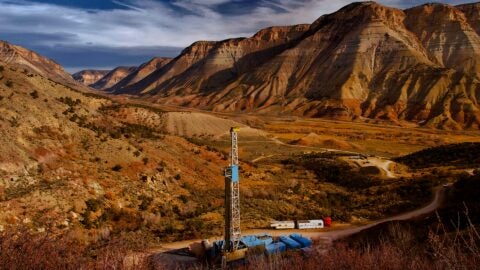
COGA and CPA Fight Common-sense Methane Regulation
 Industry trade groups – the Colorado Oil and Gas Association (COGA) and the Colorado Petroleum Association (CPA) – came out swinging against methane regulation in the third day of hearings on a groundbreaking proposal to reduce air and climate pollution coming from oil and gas operations.
Industry trade groups – the Colorado Oil and Gas Association (COGA) and the Colorado Petroleum Association (CPA) – came out swinging against methane regulation in the third day of hearings on a groundbreaking proposal to reduce air and climate pollution coming from oil and gas operations.
And some wild swinging it was!
They acknowledged that we need to reduce methane, a highly potent greenhouse gas. But they said studies are showing different results about how much methane is being leaked and vented and that we shouldn’t regulate methane until we know exactly how much is escaping.
Keep in mind, COGA was plenty happy to support the Colorado Clean Air Clean Jobs Act, which pushes electric utilities to move away from coal and start using more natural gas and clean energy resources. Methane emissions from natural gas development undermine the climate advantage gas can have over coal; but when Clean Air Clean Jobs was considered by the legislature, we sure didn’t hear any of these trade groups saying, “no, no – let’s wait until we have perfect data on methane before we do anything to transition away from coal.”
Next, contradicting their own argument about data uncertainty, COGA and CPA pointed to a University of Texas study that EDF and nine oil and gas companies participated in, and basically called it the definitive answer on how much methane is leaking. They then went on to grossly mischaracterize the study results, saying the study proved that emissions were low and that there is no need to regulate methane. In fact, the study found emissions from equipment leaks (so called “fugitive emissions”) and ubiquitous controller valves – two of the key sources targeted in the proposed Colorado rules – to be much higher than EPA estimates.
COGA and CPA also argued that we don’t need to regulate methane because we’d get the same level of methane reductions as a side benefit of just regulating VOCs. Pressed by members of the Air Quality Control Commission to explain why we shouldn’t just directly regulate methane if the net effect was the same, they had to fess up and admit that they wanted only VOCs to be regulated precisely so they wouldn’t have to reduce emissions from wells that mostly emit methane and don’t have a lot of VOCs.
Again, they said, they really do want to reduce methane. They just want it to be totally voluntary. And they want to make sure we’re going after “the right targets.” (Interesting fact: methane is the second most prevalent greenhouse gas coming from human activity in the U.S., and oil and gas activities are the single largest source. Pretty good target.)
All in all, it was a dizzying display that at times had Commissioners scratching their heads. Fortunately, leaders in industry have stepped up to support the proposed rules – companies like Noble Energy, Anadarko Petroleum, Encana and DCP Midstream – as have local governments, health professionals, students, moms and businesses that depend on clean air and a healthy climate. And of course, top credit goes to Governor Hickenlooper for putting Colorado on this path with his repeated calls for moving to “zero tolerance” for methane emissions.












